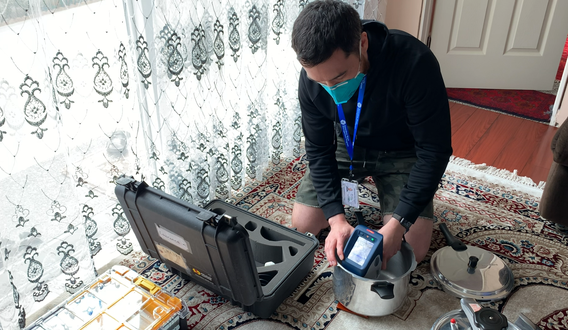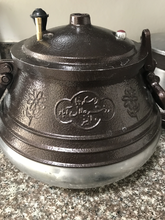Many newly resettled Afghans in the United States came through Operation Allies Welcome (OAW) Response , a coordinated interagency effort to resettle over 75,000 Afghans displaced by the Taliban takeover of Kabul in August 2021. In the midst of the ongoing COVID-19 pandemic, resettlement agencies around the country had to work rapidly with federal partners, health systems, public health practitioners, social service and community-based organizations to support newly arrived Afghans. Newly arrived Afghans are simultaneously adapting to a new life, contributing their skills to their new communities, securing public benefits, seeking opportunities for the adults and children in their families, experiencing ongoing challenges related to the trauma of sudden displacement, and navigating new systems like health care as English language learners.
One notable public health challenge that Afghan newcomers face before and after resettlement is exposure to lead and the risk of lead poisoning.
Lead Exposure: A Public Health Challenge Affecting Afghan Arrivals
Lead, a naturally occurring metal, has historically been used around the world for a variety of industrial and home applications, including paint, plumbing, batteries, gasoline, and cosmetics. In the United States, some of these uses of lead were phased out and eventually banned beginning in the 1970s, amid growing public concern about lead’s toxicity. However, lead continues to be used all around the world to a greater or lesser degree.
When lead is found in the environment, it can enter the body through three different routes:
- breathing in lead dust
- swallowing food or water or other substances contaminated with lead
- absorbing lead through direct contact with the skin.
Lead is toxic to the human body even at low levels of exposure. It adversely affects organs and systems, including the brain, heart, lungs, and kidneys. Although lead exposure is dangerous for both children and adults, children are particularly at risk since they absorb 400-500% more of the lead that enters their bodies. Numerous studies have shown that childhood lead poisoning has severe and irreversible effects. It slows cognitive development, interferes with learning, and gives rise to behavioral disturbances. In extreme cases, it can lead to coma or death.
A staggering 800 million children worldwide—nearly 1 in 3—are affected by lead poisoning. Most of these children live in Africa, Asia, Central America, South America, and Eastern Europe. Refugee children, including Afghan children resettled in the United States, are disproportionately affected by lead from exposures before they move to the US. They continue to be at risk even after resettlement because families may use imported products containing lead, such as cookware, cosmetics, and spices. One cosmetic worth noting is the eyeliner known variously as kohl, kajal, surma, tozali, kwailli, and tiro, which is widely used in regions spanning from South Asia to West Africa. Despite its reputation as a beauty product with cultural and religious significance, it often contains lead.
Often, parents are unaware that their children are exposed to lead in the home, and they are unfamiliar with the risks of lead exposure. At lower levels of lead exposure, children may initially show no symptoms or only non-specific symptoms like headaches, constipation, loss of appetite, and an inability to focus. Therefore, a blood lead level test is the best way to know whether a child is at risk of lead poisoning. The CDC currently uses a reference value of 3.5 micrograms per deciliter (3.5 μg/dL) to identify children with high blood lead levels.
A Promising Partnership in King County, Washington
Since 2019, Seattle and King County Public Health (SKCPH) has been partnering with Afghan Health Initiative (AHI) to prevent childhood lead poisoning in King County, Washington. AHI’s community health advocates, trained to navigate linguistic and cultural issues, play a crucial role supporting home health visits.
- Pre-visit: When a childhood case of elevated blood lead level is reported by the state to SKCPH, a community health advocate from AHI reaches out to the child’s parents on behalf of SKCPH in Dari, Pashto, or Farsi. The health advocate educates the parents about the work that SKCPH is doing and schedules the home health visit.

- During the visit: SKCPH health investigators come to the home with lead measurement tools and educational materials, while a community health advocate from AHI interprets and acts as a cultural broker during this encounter. The public health investigators collect samples from items in the home that may contain lead, such as: paints, foods and spices, water, herbal medicines, etc., for later testing in a lab. SKCPH’s investigators also have an x-ray fluorescence (XRF) analyzer that can detect lead in cookware on site.
- Post-visit: Based on the information gathered from the home visit and lab results, SKCPH comes up with recommendations for the family, which range from nutritional advice to suggestions to throw out or exchange particular items. A community health advocate from AHI conveys this information to the child's parents in a linguistically and culturally concordant way.

Usually after an intervention, once the family has taken the recommended actions to reduce lead exposure, the child’s blood lead level starts to decrease. The SKCPH/AHI partnership continues to check in with the family periodically, and SKCPH closes the child’s case when the blood lead level falls below the reference value.
After a local team of scientists found that traditional cookware from Afghanistan is frequently a source of lead exposure, SKCPH has been offering families the opportunity to exchange aluminum cookware for safer alternatives like Instant Pots and stainless steel pans. SKCPH and AHI even teamed up to make informational videos about Instant Pots in Dari and Pashto.
Navid Hamidi, AHI’s Executive Director, describes the lead poisoning prevention work as follows: “It's a program that we’re really proud of, and it’s very personal to me, because it’s something that is health-related and as an organization we are trying to make sure that our community is thriving and achieving that success and that American dream to their fullest potential. Preventing [lead poisoning], it’s personal to us.”
Education and Cookware Exchanges in Spokane, Washington
The International Rescue Committee (IRC) in Spokane (WA) has been partnering with the Washington State Department of Health, Washington State Department of Ecology, and Spokane Regional Health District to design, develop, and implement plain-language educational materials about lead exposure and lead poisoning for recently resettled Afghans. IRC Spokane staff found that many of the existing lead-related public health materials available in Dari and Pashto jumped too quickly to a blunt message: “Lead is bad—stop using it.” IRC Spokane’s Afghan clients needed a more sensitive approach with background information about where lead comes from, how it gets into common household objects, and why it is a problem for human health.
IRC Spokane is pairing linguistically and culturally appropriate health messaging with practical measures that Afghan families can implement right away. For example, in order to address lead exposure through food, IRC Spokane hosted a cookware exchange in which Afghan families could exchange traditional Afghan pressure cookers for stainless steel pressure cookers provided by the Washington State Department of Health. In conjunction with this event, IRC Spokane provided educational materials around the effects of diet on blood lead levels, including recipes for healthy Afghan meals that could be cooked in the new pressure cookers. In the future, IRC Spokane will host more of these cookware exchange events using pots provided by the Washington State Department of Ecology.
Dempsey Jorgenson, IRC Spokane’s Health Education Coordinator, notes that newcomers may experience a lack of control during the resettlement process, and they receive many confusing messages about what is right and wrong in their new communities. By pairing plain-language cooking and dietary advice with a tangible means to carry it out—a new pot—IRC Spokane invited Afghan clients to make changes on their own terms. “These little things that people can take control over are empowering,” says Jorgenson.